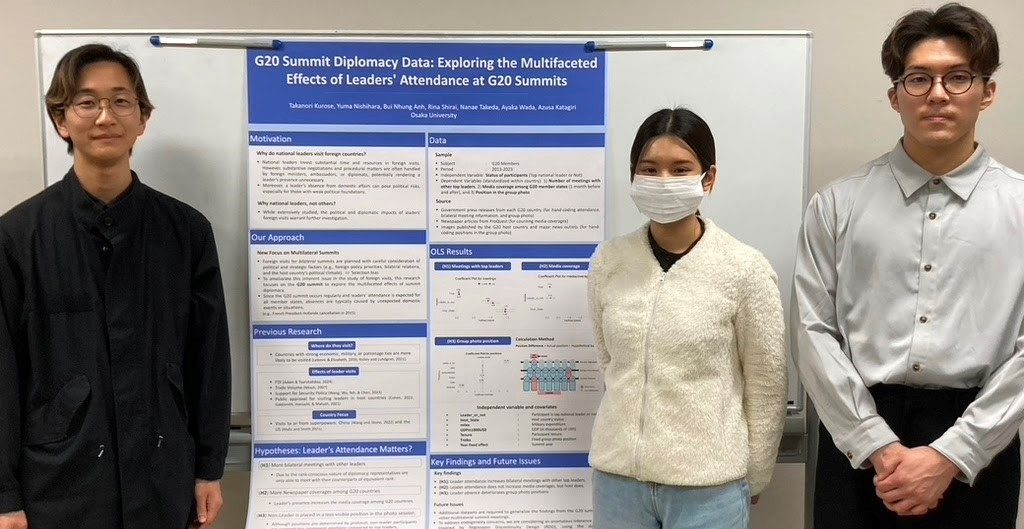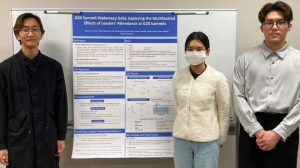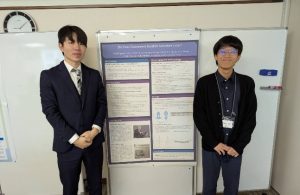片桐梓准教授 法学部国際公共政策学科ゼミ生がポスター発表
2025.1.9

片桐研究室のゼミ生がポスター発表
2025年1月5−6日にカリフォルニア大学サンディエゴ校東京オフィス(東京都中央区)で開催されたJapanese Society for Quantitative Political Science (計量・数理政治研究会)冬季研究集会で、OSIPPの片桐梓研究室の法学部国際公共政策学科ゼミ生がポスター発表を行いました。
1,Bui Nhung Anh, Takanori Kurose, Yuma Nishihara, Rina Shirai, Nanae Takeda, Ayaka Wada, and Azusa Katagiri.
“G20 Summit Diplomacy Data: Exploring the Multifaceted Effects of Leaders’ Attendance at G20 Summits.”
<Abstract>
ポスター発表時の西原悠宇さん(左)・Bui Nhung Anhさん(中央)・黒瀬天孝さん(右)
Why do state leaders prioritize foreign visits despite their tight schedules and the significant political and economic costs involved, rather than delegating these tasks to other government officials? If summit diplomacy offers distinct benefits, how can its effects be measured with clarity and precision? A growing body of research addresses these questions through the lenses of costly signaling (Smith and Malis 2019; McManus 2023) and public diplomacy (Goldsmith et al. 2021). However, a persistent challenge in this field is the selection bias inherent in bilateral state visits, which complicates reliable estimations of summit diplomacy’s impact. This paper seeks to address this methodological issue by leveraging instances of last-minute cancellations by state leaders at G20 summits. We introduce a novel dataset on leaders’ attendance and relevant outcome variables at G20 summits. Our analysis highlights the multifaceted impacts of summit diplomacy, including the number of bilateral meetings with other top leaders on the summit’s sidelines, media coverage, and leaders’ visibility in official photo sessions. Although the empirical investigation is ongoing, this study aims to provide fresh insights by bridging the gap between the practice of real-world diplomacy and theoretical accounts of summit diplomacy.
2.Yuki Kogane, Akari Uchita, Mizuki Nakano, Michiaki Hioki, Rin Miyake, Yuto Morita, Chihiro Yasuda, Yuki Yamane, and Azusa Katagiri.
“Do Time Constraints Escalate Interstate Crisis?”
<Abstract>
ポスター発表時の山根佑生さん(左)・古金優樹さん(右)
Crisis escalation is a cornerstone of conflict studies. However, empirical research systematically investigating the escalation process remains limited, largely due to a lack of observational data. Classical works on interstate conflict (e.g., Snyder and Diesing, 1977) suggest that time constraints—among other factors—affect policymakers’ decisions during international crises. Despite these theoretical insights, empirical evidence on the role of time pressure remains sparse. This project explores how temporal constraints, such as deadlines imposed by adversaries, shape decision-making processes and influence conflict escalation pathways. To empirically examine these patterns, we leverage the recently developed Interstate Crisis Behavior Events dataset (ICBe). This innovative dataset enables detailed analysis of crisis events, capturing the evolution from diplomatic tensions to military engagements. We identified and analyzed sentences related to time constraints from the ICBe dataset. Using propensity score and interrupted time series analyses, we assessed their impact on escalation dynamics. Our findings reveal that time constraints have no significant association with the escalation of conflicts. This research contributes to a deeper understanding of the mechanisms underlying conflict escalation.


